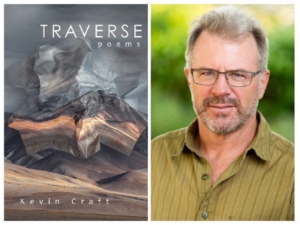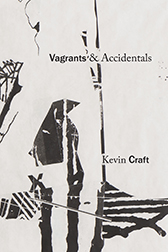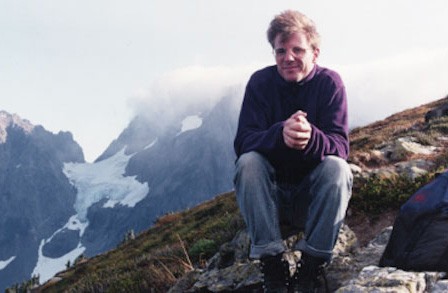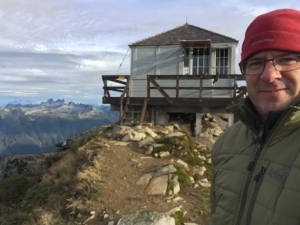Kevin Craft, TRAVERSE
TRAVERSE, Kevin Craft. Lynx House Press, Spokane, WA, 2024, 130 pages, $25, lynxhousepress.com.
I’ve known Kevin Craft a long time. We were colleagues at Everett Community College, beginning in 1998, and our bond of poetry drew us into friendship. He was always the star, with awards and grants and travel—including to France each summer to teach. He had a knack for making opportunities for himself that I (frankly) drooled over. But we had other, more home-bound threads connecting us as well, including many of the threads found in these poems: parenting, adoption, navigating the intricacies and interstices of family. Who do we belong to? Who belongs to us? Sometimes this theme plays like a lament, as when he echoes Emily Dickinson with, “My life had stood me up one too many times” (“Only If You’re Feeling Better”). In others, it’s a messy celebration: “Into gravity a history of spontaneous alleles” (“Game Theory: A Primer”).
I love the way the poems in Traverse aren’t linear (not usually), but always complex and witty and woven. The first poem, “In Extremis,” launches with: “One man skis alone across Antarctica. / Another pulls morning glory // off a rotting backyard fence.” One world, multiplied. In another poem, a daughter rescues a ruby-crowned kinglet; in another poem, two daughters rescue a father. (I have to add, birds are woven throughout the book, too—snow geese, an Anna’s hummingbird, red-tail hawks, hermit thrush…). I had a sense, reading this book, of circles within circles where human varieties of existence and all of nature nest together in contiguous if uncomfortable relationship. Like they do. These lines, for instance, opening “A Few Pre-Existing Conditions”:
We drank too much.
Stayed up late watching late night turn to laughter
as the elephants disappeared.
Oh, yes. Or this:
Elevator Pitch
First the doors won’t close, then they won’t pry
open, between them the tall tale self-replacing.
We talk it through—a night train rattling high-rise windows—
beginning of the middle, middle of the end,
though sometimes whole chapters fall from the sky
like pieces of a space station. Once I wanted
to be an astronaut. The sky is a laboratory
into which we pour our excess lives.
Some appear in dreams like the family reunion,
the gull-circled landfill, that day I turned the blue car
into oncoming traffic. Our grandmothers went to town
in a horse-drawn buggy. A single cell becomes a city
is one way to muscle through this backstory
hanging over breakfast like a shroud.—Kevin Craft

Kevin is the featured reader at Everett Poetry Night on Monday, October 7, 5-8 p.m. As I recall, the reading begins at 6:00, but you want to come early—to grab some dinner and find a seat, and to sign up for the open mike. I plan to attend. Go to https://duanekirbyjensen.wixsite.com/everett-poetry-night/features-poets-2024 to learn more
To learn more about Kevin, visit Lynx House Press, or this page: https://www.poetryfoundation.org/poets/kevin-craft. Or buy the book!






 It had been awhile since I googled my friend, poet and editor extraordinaire
It had been awhile since I googled my friend, poet and editor extraordinaire